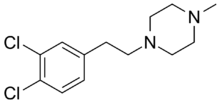BD1063
BD1063 or 1-[2-(3,4-dichlorophenyl)ethyl]-4-methylpiperazine is a selective sigma receptor antagonist, with a reported binding affinity of Ki = 9 ± 1 nM for the sigma-1 receptor and more than 49 times selectivity over the sigma-2 receptor.[1]
 | |
| Identifiers | |
|---|---|
| |
| CAS Number | |
| ChemSpider | |
| CompTox Dashboard (EPA) | |
| ECHA InfoCard | 100.229.843 |
| Chemical and physical data | |
| Formula | C13H18Cl2N2 |
| Molar mass | 273.20 g·mol−1 |
| 3D model (JSmol) | |
| |
| |
Consistent with other reported sigma receptor antagonists, pretreating Swiss Webster mice with BD1063 significantly decreases the convulsivity and lethality of cocaine.[1]
In other animal studies, BD1063 blocks the effects of MDMA,[2] and reduces alcohol intake in rodent models of alcoholism.[3]
References
- Matsumoto RR, McCracken KA, Friedman MJ, Pouw B, De Costa BR, Bowen WD (2001). "Conformationally restricted analogs of BD1008 and an antisense oligodeoxynucleotide targeting sigma1 receptors produce anti-cocaine effects in mice". Eur. J. Pharmacol. 419 (2–3): 163–74. doi:10.1016/s0014-2999(01)00968-2. PMID 11426838.
- Brammer MK, Gilmore DL, Matsumoto RR (December 2006). "Interactions between 3,4-methylenedioxymethamphetamine and sigma1 receptors". European Journal of Pharmacology. 553 (1–3): 141–5. doi:10.1016/j.ejphar.2006.09.038. PMC 1780037. PMID 17070798.
- Sabino V, Cottone P, Zhao Y, Iyer MR, Steardo L, Steardo L, Rice KC, Conti B, Koob GF, Zorrilla EP (May 2009). "The sigma-receptor antagonist BD-1063 decreases ethanol intake and reinforcement in animal models of excessive drinking". Neuropsychopharmacology. 34 (6): 1482–93. doi:10.1038/npp.2008.192. PMC 2669694. PMID 18946467.
This article is issued from Wikipedia. The text is licensed under Creative Commons - Attribution - Sharealike. Additional terms may apply for the media files.